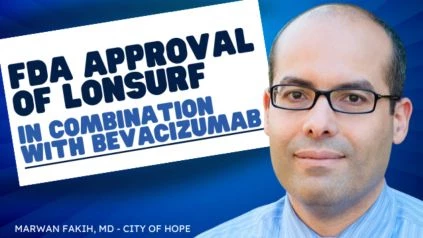Marwan Fakih, MD – City of Hope – FDA Approval of LONSURF in combination with Bevacizumab
The FDA approval of Lonsurf plus Bevacizumab represents a significant breakthrough in the treatment of metastatic colorectal cancer. This combination therapy offers new hope for patients who have previously exhausted their treatment options, providing substantial improvements in both overall survival and progression-free survival.
The clinical trial results from the Sunlight trial have solidified Lonsurf plus Bevacizumab as the standard third-line treatment for metastatic colorectal cancer, with potential implications for future research and control arms in clinical trials. Physicians are encouraged to consider this combination for eligible patients and discuss its benefits and risks as it reshapes the treatment landscape in this challenging disease.
Questions
Can you provide an overview of the recent FDA approval of LONSURF® in combination with bevacizumab for the treatment of metastatic colorectal cancer (mCRC)? What are the key details about this approval?
How significant is the approval of LONSURF® plus bevacizumab for patients with metastatic colorectal cancer who have previously undergone fluoropyrimidine-, oxaliplatin-, and irinotecan-based chemotherapy?
Could you explain the clinical trial design of the SUNLIGHT trial that led to this approval? What were the key endpoints and results of the trial?
The combination of LONSURF® plus bevacizumab showed statistically significant improvements in overall survival and progression-free survival compared to LONSURF alone. Could you discuss the magnitude of these improvements?
Were there any specific patient subgroups that particularly benefited from the combination treatment of LONSURF® and bevacizumab?
What were the most common adverse events associated with the combination of LONSURF® and bevacizumab in the SUNLIGHT trial? How manageable were these adverse events?
The approval covers patients previously treated with anti-VEGF biological therapy and, if RAS wild-type, anti-EGFR therapy. Could you explain the significance of RAS wild-type status in this context?
How does this FDA approval impact the current treatment landscape for metastatic colorectal cancer? Are there any other notable treatment options available?
Are there any specific considerations for patients with metastatic colorectal cancer who are considering treatment with LONSURF® plus bevacizumab?
What should physicians communicate to their patients?
What are the next steps for physicians now that LONSURF® plus bevacizumab has been approved? Are there any ongoing studies or initiatives related to this treatment?

